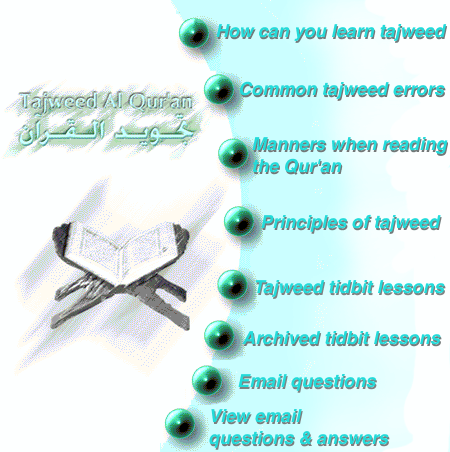Introduction
to the Characteristics of Letters

The
characteristics of the letters are what differentiate letters from others
that share the same articulation point.
If the student of the Qur’an is not applying all the
characteristics of the particular letter he/she is articulating, it will
sound either like a totally different letter, or will sound incorrect at
the very least. The correct
application of the characteristics of the letters makes the letters
clearer, and teaches the various timings of the saakin letters, a very
important aspect to good Qur’anic recitation.
Studying the characteristics makes clear which letters are strong
in make up, and which are weak. From
this it is clear that the study of the characteristics of the letters and
their application is a very important part of tajweed.
Indeed, the application of the characteristics of letters is what
differentiates a good reciter from an average one.
Linguistic
definition of characteristics: What
serves the purpose of describing the meaning.
This can be in the way of physical descriptions such as white and black,
or can be abstract descriptions such as education.
Applied
definition of characteristics:
The mode of demonstration of the letter when it occurs at its
articulation point, which differentiates it from others (other
letters)
Two
Divisions of Characteristics
1.
Intrinsic or Basic
Characteristics
 : These
are characteristics that are part of the intrinsic make up of the letter
and never leave the letter. This
is what will be discussed in this section over the next several tidbit
lessons.
: These
are characteristics that are part of the intrinsic make up of the letter
and never leave the letter. This
is what will be discussed in this section over the next several tidbit
lessons.
2.
Presented
Characteristics
 :
These are characteristics which are present in a letter in some
cases, and not present in the letter in other cases.
An example of this would be
:
These are characteristics which are present in a letter in some
cases, and not present in the letter in other cases.
An example of this would be
 (or
merging), or
(or
merging), or
 (or
making clear). These are covered in other areas of the tidbit lessons, and
not discussed in this section of lessons.
(or
making clear). These are covered in other areas of the tidbit lessons, and
not discussed in this section of lessons.
The
Intrinsic or Basic Characteristics

There
are ten intrinsic characteristics in pairs; each characteristic of the
pair is opposite to the other characteristic in the pair. There are also six singular characteristics that have no
opposites. Every letter has
at least five characteristics, one of each of the pairs of opposites.
Ten
Characteristics that have opposites
These
pairs (sometimes there is more than two in the pair) are those that each
letter has one of each. This
means that every letter has at least five intrinsic characteristics that
never leave the letter. A
letter can never have both characteristics in an opposing group, only one
of the two (or three) in the group. We
will, insha’ Allah, over the next several tidbit lessons describe these
characteristics and their application in recitation, as well as the six characteristics
that do not have opposites. The
five groups of opposite characteristics that each letter has one each of
is as follows:
The
Characteristic
|
Its
Opposite
|
|
The
whisper

|
The
apparent

|
|
The
Strength and The In
between
 and and

|
Softness

|
|
The
Elevation

|
The
Lowering

|
|
The
Adhesion, occlusion

|
The
Openness

|
|
The
Fluency

|
The
Forbidden

|
There
are also some characteristics that certain letters have which have no
opposites. The letters that
have these characteristics therefore have more than five intrinsic
characteristics. These
non-paired intrinsic characteristics are as follows:
Six
Characteristics without Opposites
1.
The Whistle

2.
The Softness

3.
The Drifting

4.
The Repetition

5.
The Spreading Around

6.
The Lengthening


![]()
![]()
![]()
![]()
![]()
![]()